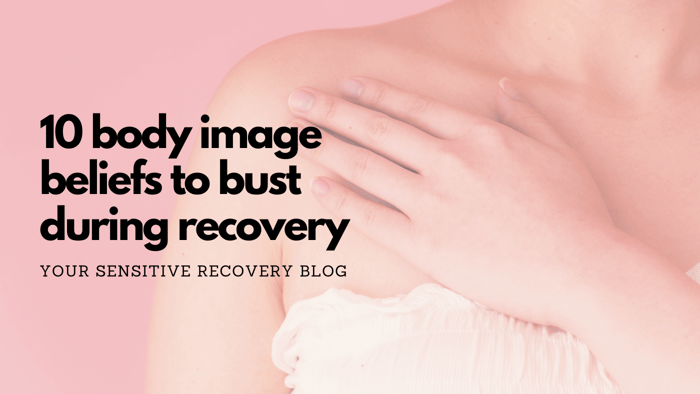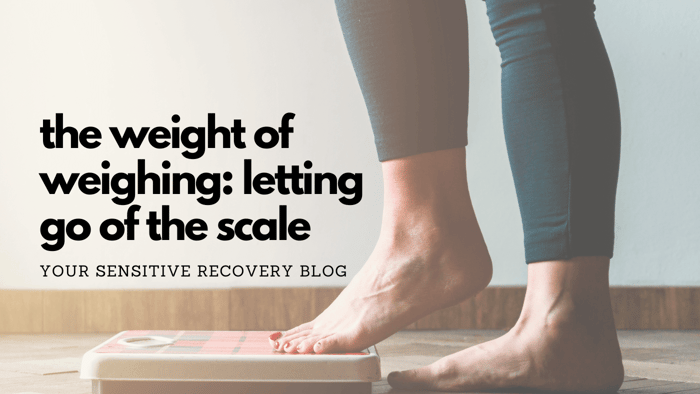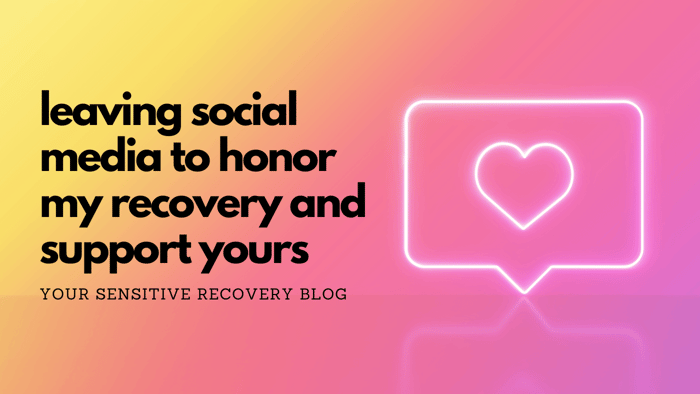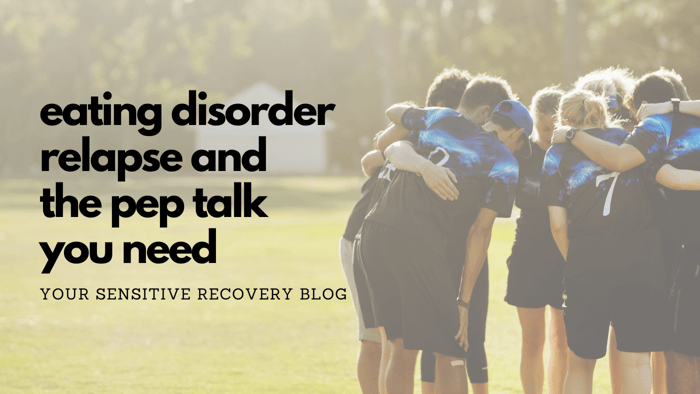Bad body image can be a beast. A negative perception of your body shape and/or size is not only a risk factor for the development of an eating disorder but a symptom in and of itself that can maintain disordered behaviors. It is extremely challenging to live with negative body image and to be bombarded by seemingly non-stop, hypercritical thoughts about your shape, size, and weight. But there is hope!
Many people develop eating disorders while on a quest to improve their body image. However, it's important to note that not all eating disorders include a preoccupation with weight. For me, my eating disorder developed at a time when I actually had fairly good body image, however as the illness progressed, that positive self-perception crumbled quickly. But for some folks (like those with ARFID or Pica for example), body image is not typically a part of their eating disorder experience.
The beliefs we hold about our bodies can either support or sabotage our healing journey, and this is the case for both body image-related eating disorders and those that are unrelated to body image. In this post, I'll share 10 common beliefs that might be holding you back in recovery and offer healthier, more empowering perspectives for you to embrace instead.
First of All, What Is Body Image?
Before we dive in, I'd like to shed some light on what body image actually is, because it's more complex than we tend to think it is. We typically think that body image is solely about what we FEEL about what we SEE. And yes, that's part of it...
Body image is a "Greatest Hits" collection of our perceptions, feelings, thoughts, and beliefs about our body.This collection includes how we see our body visually, how we physically experience it, and most importantly, the thoughts we have and the meanings we make of all these things.
10 Body Image Beliefs to Challenge
Alright. Let's dig in now to common beliefs related to bodies and body image. I'll share why each is harmful and give you a new perspective, plus an action step you can take to begin creating a new body-image creed. 😉
1. I'll be happy once I reach a specific weight or size.
Why it Hurts: Tying happiness to a specific weight or size keeps you stuck in a cycle of deep dissatisfaction and despair. And when it comes to eating disorders, that specific number you're going for will never be enough. Eating disorders are constantly moving back the goal line each time you approach it. It's maddening and so dangerous.
A New Perspective: True happiness is never a destination. I know it sounds cheesy, but it really is about the journey. Happiness does not come from external measures but develops as a result of prioritizing your well-being and living a life aligned with your values.
Action Step: Take a few minutes to journal about non-appearance-related sources of joy and meaning in your life.
2. My worth is defined by how I look / how much I weigh.
Why it Hurts: This belief reduces your entire identity to Just. Your. Appearance. And the world would love for you to go right along believing that because when you're focused on getting smaller or fitter, you might not have energy left over to deal with the really important shit that's happening - like the world literally burning up.
A New Perspective: Your true worth is inherent and not dependent on your appearance. You are valuable simply because you exist. And you have WAY more to bring to the table and always have.
Action Step: Create a list of your qualities, skills, and achievements you admire that have nothing to do with your body.
3. “Being thinner means being healthier.”
Why it Hurts: We cannot determine health by weight. We just can't. It’s so much more complex. It's about behaviors, genetics, and other factors...like STRESS levels. And you know what's stressful? Trying to consistently shrink. Let's say it louder for the people in the back: Correlation is not the same as causation!
A New Perspective: It's way more beneficial to your health to increase behaviors that you know will nourish your body and mind, like eating regularly, moving in ways that feel good, practicing mindfulness, and resting.
Action Step: Do some research on the principles of Health at Every Size (HAES). There's a lot of scientifically sound, peer-reviewed, jaw-dropping information out there that I can't wait for you to find.
4. “I can’t love and accept myself until my body looks different.”
Why it Hurts: Self-love is not something that occurs as a result of your body-related achievements. It's a choice and a practice. Placing conditions on self-love delays your healing and keeps you on a merry-go-round; you're moving, but only going in circles.
A New Perspective: Self-compassion is an action you can practice now, regardless of your body’s appearance. It's a billion little actions, actually. Dig in!
Action Step: When you come to a decision in your day, ask yourself, "Which option is most loving toward me? What would I encourage my best friend or my child to choose in this situation?"
5. “My body is broken / is the enemy / is against me.”
Why it Hurts: It's all too easy for a body to become a scapegoat. It makes sense because we think that if it's our body's fault, then just maybe we can do something about it. When we make an enemy of our body, it fuels a combative relationship with ourselves, making it harder to recover and flourish.
A New Perspective: Your body is constantly striving for optimal functioning, even when it doesn't feel that way. It is trying to protect you and keep you alive, even if it is struggling to do so due to illness or circumstances. It has been your ally since day 1 and deserves your care and kindness.
Action Step: Write an apology letter to your body for the ways you may have mistreated it and the way you've spoken to it. (It can be powerful to use a pronoun for your body if that feels ok. It's harder to be cruel to something we humanize.)
6. “I have to control my body so I'm not out of control."
Why it Hurts: We only try to control what we don't trust. And it's almost impossible to live in this society and not internalize the message that our bodies cannot be trusted. If we believed we could trust our bodies, how would they sell us so many things? The more you focus on controlling your body, the more out-of-control, or just on the verge of out-of-control it begins to feel. You're feeding the illusion.
A New Perspective: Real control comes from accepting what you cannot change and focusing on what you can, such as your thoughts and your behaviors. If acceptance feels like giving up to you, I encourage you to Google the difference between acceptance and resignation.
Action Step: Practice acceptance through mindfulness or grounding exercises. Try being with what it is, even if just for a minute at a time. If we're practicing acceptance, the loud voices will eventually quiet, because their panicked cries will be falling on deaf ears. We hear them, but we realize we do not have to act on them.
7. “Everyone is judging how I look.”
Why it Hurts: This belief stems from our own internalized judgment and amplifies our anxiety and self-consciousness. Someone out there will judge you because of how you look. And that will happen no matter how you look. You will also judge someone else for the way they look. We're all swimming in this sea. Do you wanna get out?
A New Perspective: Get out of everyone else's head. What they're thinking is none of your business (although, yes, sometimes they try to make it your business). And to those folks, I say kindly f*ck off.
Action Step: When the fear of judgment arises, whisper to yourself, "Get out of their head." And while you're at it, practice correcting any body-related automatic judgments you have of others.
8. “I’ll never feel confident in my body.”
Why it Hurts: This kind of belief makes the assumption that confidence is a fixed state rather than a skill you can build over time. And if you made it out of your teenage years, you have probably realized by now just how much confidence can wax and wane. What's cool is when we realize how much more powerful confidence is when boosted by our own self-validation, and not the validation of other people.
A New Perspective: Confidence grows from self-acceptance and showing up for yourself, not from meeting society's standards about bodies and beauty.
Action Step: Take small steps to challenge body shame, like wearing an outfit that makes you feel good, or going without makeup for a day. Warning: This can begin to feel like a fun act of resistance - enjoy. 😉
9. “If I gain weight, I won't be loved or accepted”
Why it Hurts: It ties your acceptance to external factors and ignores the quality and fit of your relationships. And how frightening, indeed. A belief like this fuels anxiety around the state of your past, current, and future relationships.
A New Perspective: Deep love and acceptance are not conditional on size; they're built on mutual respect, trust, and connection.
Action Step: Reflect on relationships in your life where love and care aren’t dependent on appearance. How do these relationships differ from some others that you felt maybe were?
10. “I have to love my body to recover.”
Why it Hurts: Expecting and needing to jump from self-hate all the way to self-love can feel overwhelming and frankly, is unrealistic. There are many stops along the way, like tolerating...accepting...appreciating...respecting...maybe liking, and then yes, maybe loving your body one day. But loving your body, much like happiness, is a conscious path we walk more than a destination.
A New Perspective: Body neutrality, respecting your body for what it does rather than how it looks, is a powerful step toward healing. Could that be a more supportive intention for your recovery?
Action Step: Practice gratitude for your body’s functions, like breathing, walking, or hugging loved ones. Make a list of 100 things you're glad your body does or can do.
Your Body - Your Home, Your Vessel.
Recovery, in so many ways, is about coming home to yourself. Your body has been with you through every step of your life's journey, carrying you through all the highs and lows. While it may feel like an adversary at times, it is truly your soul's home; a vessel uniquely equipped to hold all of your emotions; experiences, and growth.
As you move through and beyond recovery, I encourage you to approach your body with curiosity, and compassion. Rather than battling against it, seek to understand its needs, honor its signals, and nurture it as you would a beloved friend.
You are not defined by your eating disorder, but rather by the courage it takes to heal, the resilience it takes to grow and embrace your truest self, and the love you offer yourself and others along the way. Trust in your vessel, and it will carry you toward the freedom and peace you deserve. Remember: you don’t have to go through this alone. Support is available, and you’re capable of building a healthier, more peaceful relationship with your body.
❤️🩹
✨ Josie Munroe, LMFT is a licensed therapist and owner of JosieMunroe.com and Your Sensitive Recovery. As a recovered clinician and Highly Sensitive Person, she loves supporting others on their journeys to form new, empowered relationships with food, their bodies, and their sensitivity. Join the newsletter for a weekly boost of hope and inspiration. You deserve a recovery that works for you! ✨





